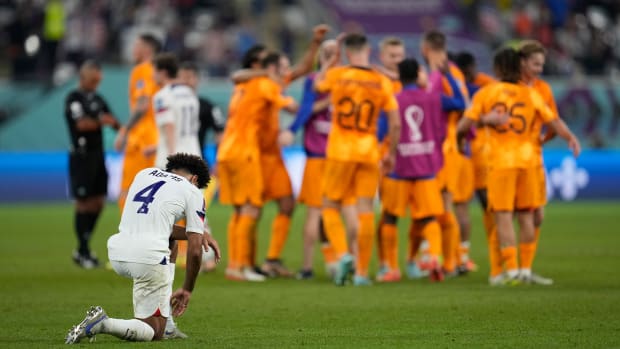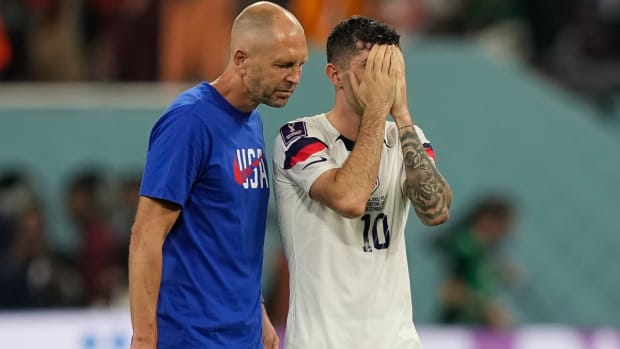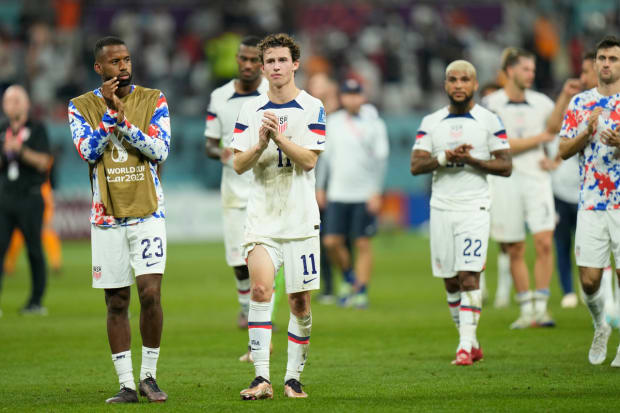There are still barriers for this group and its young core to break, but the Netherlands’ ruthlessness over key moments spelled the end for the U.S.
AL RAYYAN, Qatar — The heart was willing.
In their fourth World Cup match in 13 days, in the unforgiving crucible and rarified air of the knockout stage, the young American men gave everything. And as they promised, they stood tall and toe-to-toe with the favored Netherlands without fear or reservation. They forged forward, out-possessed, out-passed and outshot the Dutch by a significant margin, and never sagged in the face of adversity. The U.S. tried everything. Walker Zimmerman, the 6’ 2”, 196-pound center back, even attempted to score on a bicycle kick in the 86th minute.
The heart was willing. But the legs and brain seemed spent. In those small but critical moments that decide the toughest games against the most seasoned, skillful opposition, the U.S. faltered. And so it's headed home, 3–1 loser to the Netherlands, ranked eighth in the world and unbeaten in 17 months, here at Khalifa International Stadium.
World Cups are marathons measured in 90-minute increments. The fuel the Americans expended to escape this tournament’s toughest group (based on FIFA ranking), which required three rigorous, fraught, down-to-the-wire matches, wasn’t so easily replenished. So the Dutch didn’t look that stylish or convincing in their 2-0-1 slog through the first round. They didn’t have to.
Teams at that tier—those who fancy themselves World Cup contenders—don’t spend dearly just to scrape by. They have additional gears, different levels and depth and energy in reserve. They have the quality and composure to execute in the moments that matter most. For those teams, the group stage is just the beginning. The U.S. started nine players in each of its four games here in Qatar. And they were a step behind, or an inch off, on enough occasions in Saturday’s round-of-16 showdown to make the agonizing difference.

Natacha Pisarenko/AP
“I think overall we can be really happy with our performance—the way we adapted, the way that we make teams uncomfortable,” U.S. captain Tyler Adams said. “In the [first] three games, I'd say we defended the [decisive] moments really, really well. And today, the three goals come from moments where we're probably sleeping a little bit.
“These games, if there's anything that this team will take away from it, is that it comes down to the margins, man. It comes down to the margins.”
Said goalkeeper Matt Turner, who made at least three stunning saves, “I think we did some great things tonight, but we also did some things that were very uncharacteristic of us overall—especially defensively.
“The silence is deafening,” he continued. “Everyone is disappointed. Everyone is in a somber mood, because we knew that we could compete in this game and we did do that. But competing and losing doesn’t make it feel better.”
The Americans kicked off on the front foot, pushed the Dutch back and nearly scored in just the second minute when Adams chipped the defense and found Christian Pulisic alone. The U.S. star had scored the decisive goal in Tuesday’s win over Iran but at the Khalifa, his point-blank shot was saved by the Netherlands’ Andries Noppert.
It comes down to the margins.
Eight minutes later, on what was essentially their first chance of the game, the Dutch took the lead. The Oranje had been sitting back, refusing to press the U.S. while forcing center backs Zimmerman and Tim Ream to pull most of the strings in the build-up. Although that set them up to counter through wingbacks Daley Blind and Denzel Dumfries, it was a 20-pass possession that led to their opening goal. The Americans lacked just that little bit of extra vigor, and when Dumfries cut his cross back toward the top of the U.S. penalty area, Barcelona’s Memphis Depay was all alone. Adams had failed to recover fast enough, and Yunus Musah was late filling the gap.
With the final kick of the first half, the Dutch found the dagger on a similar play. This time it was Blind racing in from the left, past Sergiño Dest, and cleanly finishing another cut-back cross. The U.S. was the only team at this World Cup that didn’t yield a goal from open play during the group stage (Wales scored from the penalty spot.) But the spaces and runners that had been closed down then were open on Saturday. And the Dutch didn’t miss.

Martin Meissner/AP
“It's just moments that a player's off a little bit here, there, and it ends up in the back of the net, and when you play at this level, when you play this high quality, that's what happens,” U.S. coach Gregg Berhalter said. “It's unfortunate it happens in a knockout game, but it did. We’ve got to learn from it.”
Unfortunate and, in a way, inevitable. This is when it was always likely to happen—when an inexperienced team that’s close to reaching its potential comes up against one that’s been here before, and which hails from a nation that’s been producing world-class players for decades.
“To me, there was some offensive quality, offensive finishing quality, that Holland had that we’re lacking a little bit,” Berhalter continued. “It’s [a matter of] time. It's normal. We have a very young group. We have players that are beginning their careers, and they're gonna catch up to that …We don't have a Memphis Depay right now.”
A downcast Pulisic said, "We were down, 2–0, but it didn't feel like it should be that way. But that's what good teams do—they punish you.”
But the Americans fought back, as they always do. Gio Reyna came on at the start of the second half in his first extended action at this World Cup, first up front in place of Jesús Ferreira then at right wing once Haji Wright entered the match (striker Josh Sargent was out with a sprained ankle). The game opened up and the teams traded chances. Ream came close off a corner kick in the 49th minute, Pulisic and Weston McKennie had good looks shortly thereafter, and then Turner denied the Dutch with a brilliant double-save in the 71st. Five minutes later, Wright got his foot to a Pulisic cross and the ball spun over Noppert and in. The Americans were alive. The heart was all in.
“They go like crazy—like hell,” the Dutch keeper said of the Americans. “They work together. They don’t give up.”
But it was the Dutch who’d get the next goal on yet another cross—this time from Blind—to another wide-open target—this time Dumfries, who was all alone at the right post in the 81st. Left back Antonee Robinson, who’d played every minute of the World Cup (and played well) and who’d been down on the field injured about 15 minutes earlier, was out of the play.
“I think maybe they pulled our team apart a little bit in terms of positioning,” Robinson said. “We’re all eager and keen to try and get out to the ball and maybe at times that means, including myself, we got lost going to the ball and leaving a bit of space. So on another day, that might not happen. But today it did, and we got punished for it.”
Those are the margins at altitude.
“I think from an energy perspective—from a physical output, from a mental output—you gave everything you have. But I think when you look at that game, I'm not gonna sit here and say Holland was better,” Adams said, refusing to use fatigue as an excuse for physical or mental lapses.
“We made them uncomfortable for a majority of the game—more uncomfortable than the rest of their games,” he added. “And I think that a lot of teams would say they wouldn't want to play against us, the way that we play. So it's frustrating.”

Francisco Seco/AP
The U.S. earned respect and plaudits here in Qatar for its aggression, relentlessness, clear cohesion, and for the way it carried itself on and off the field. The program is growing. Everyone sees it, and the Americans are far from an easy out. But there are levels to this, and the climb from the group stage to Saturday’s round-of-16 summit was steep. This is where the elite thrive. The U.S. has advanced from its group and won a knockout game just once in 92 years. Since returning to the World Cup in 1990—the program’s modern era—it’s 1-12-7 against European opposition.
The Americans have improved. But they were still going to have to be fit, fresh and close to perfect to move on.
Nevertheless, it was clear over the past three weeks that an identity, a culture and a lot of self belief had been forged. The U.S. wasn’t just happy to be here. Players were crushed, sullen and despondent as they spoke following the game. The gap between the U.S. and the title contenders is real, but the men in uniform see a time when it’ll narrow. Berhalter, whose contract expires at the end of the month, fielded four of the five youngest starting lineups at this tournament so far. His players are at many of the sport’s top clubs, and they know they gave “big teams” like England and the Netherlands plenty to think about.
This national team has become a calling, a quest and a refuge for many of them. The pain was real. Pulisic stood at midfield for several minutes after the final whistle and was hugged and consoled by a succession of compatriots. Adams was on his knees, huddled with a U.S. staffer. They’d given everything.
“Can we perform well against top teams well enough to win? Today is a strange type of outcome in a game like this, when we perform really well, especially in the first half,” Berhalter said. “So I think this group is close. To be fielding the youngest lineups in the World Cup … the American public should be optimistic.”
McKennie said, “We had a common goal four years ago—a mission that we set out on which was to change the way the world views American soccer. I think this tournament has really restored a lot of belief, restored a lot of respect to U.S. Soccer and soccer in our country.
“I think we've shown that we can be giants eventually,” he concluded. “We may not be there yet, but I think we're definitely on our way. And I think we've shown that we can compete with top-tier teams.”